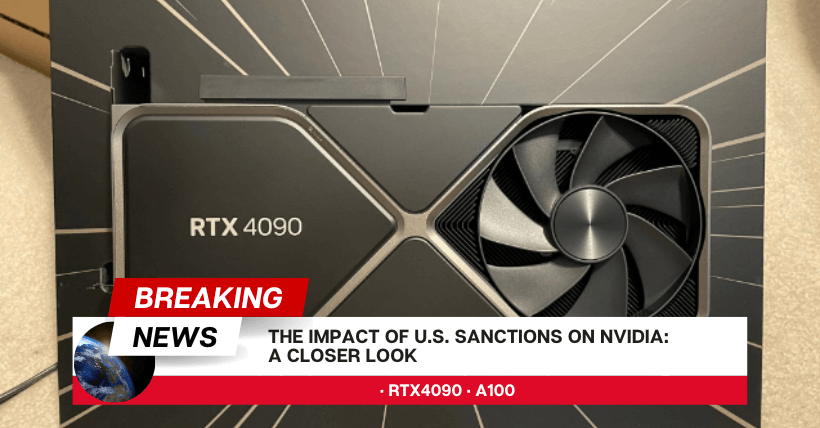In recent news, the United States has imposed a new round of sanctions that have sent shockwaves throughout the tech industry. These sanctions specifically target NVIDIA, a renowned manufacturer of graphics cards, and have far-reaching implications, especially for the Chinese market. This article delves into the details of the sanctions and their potential consequences.
01
Understanding the Sanctions
According to the latest reports, the United States has imposed sanctions that will prevent NVIDIA from selling seven models of graphics cards in China. Notably, the affected models include the NVIDIA RTX 4090 and A100. These sanctions have already led to significant repercussions within China’s tech landscape.
02
Immediate Actions by NVIDIA and Its Partners
In response to the sanctions, domestic NVIDIA flagship stores in China have taken swift action. The NVIDIA RTX 4090 graphics card, one of the affected models, has been removed from their shelves. Moreover, partners of NVIDIA, such as ASUS and Colorful, have also taken similar measures. The non-public version of the RTX 4090 is now listed as “out of stock” in their stores.
Even JD.com, one of China’s leading e-commerce giants, has removed all RTX 4090 models from its self-operated stores. This rapid response by various stakeholders in the Chinese tech market underscores the severity of the sanctions.
03
The Countdown to November 17th
The new regulations are scheduled to officially take effect on November 17th. This date marks a crucial turning point in the fate of the NVIDIA RTX 4090 graphics card. A decision regarding the future availability of this card in China will be made 30 days after the sanctions are implemented.
This timeline introduces an element of uncertainty, which has already prompted speculation about the actions that AI suppliers in mainland China will take. Many remember the rush to deliver goods that characterized the fall of 2018, and it is likely that a similar scenario will unfold this time as well.
04
The Future of Graphics Cards in China
Beyond the immediate impact on the RTX 4090, these sanctions could have a lasting effect on the availability of future 50 series graphics cards in the Chinese market. The regulations put in place will create hurdles for NVIDIA and other manufacturers, making it challenging for new graphics card models to enter the Chinese market.
As a result, apart from the A cards, China may have to rely on its own version of Moore’s Law, implying that domestic manufacturers will have to fill the void left by the absence of NVIDIA products. This shift in dynamics could lead to significant developments in the Chinese tech industry.
05
Stock Market Repercussions
The sanctions have not only shaken the tech industry but also had a profound impact on the stock market. NVIDIA’s stock price has experienced a consecutive two-day decline, resulting in a cumulative drop of 8.46%. It is worth noting that this decline in NVIDIA’s stock has not occurred in isolation.
Other major players in the chip manufacturing industry have also felt the effects. ASML, a key player in semiconductor manufacturing, saw a decline of 4.17% in its stock price. Meanwhile, AMD and Intel, two major competitors of NVIDIA, witnessed declines of 2.82% and 1.16%, respectively.
The ripple effect of the sanctions is evident in the broader market, as investors and industry experts grapple with the implications of these developments.
06
Conclusion
The new round of sanctions imposed by the United States on NVIDIA has sent shockwaves throughout the tech industry, particularly in China. The removal of seven models of graphics cards, including the NVIDIA RTX 4090 and A100, has left stakeholders scrambling to adapt to the changing landscape. The consequences of these sanctions will become clearer as we approach the November 17th deadline, which marks the official implementation of the regulations.
The broader implications of these sanctions include the potential reshaping of the Chinese graphics card market and the impact on related stock prices. As the tech world watches closely, the future of NVIDIA and its competitors in China remains uncertain. Only time will reveal the full extent of the repercussions of these sanctions.

Related:








